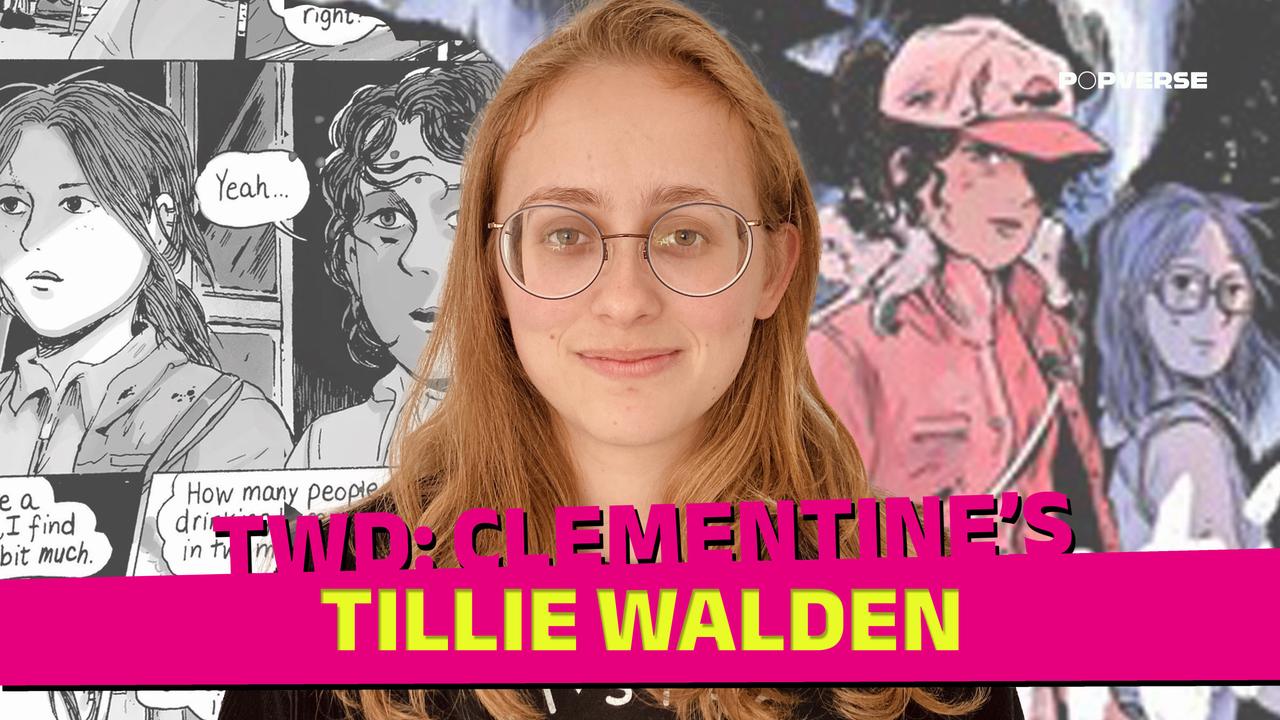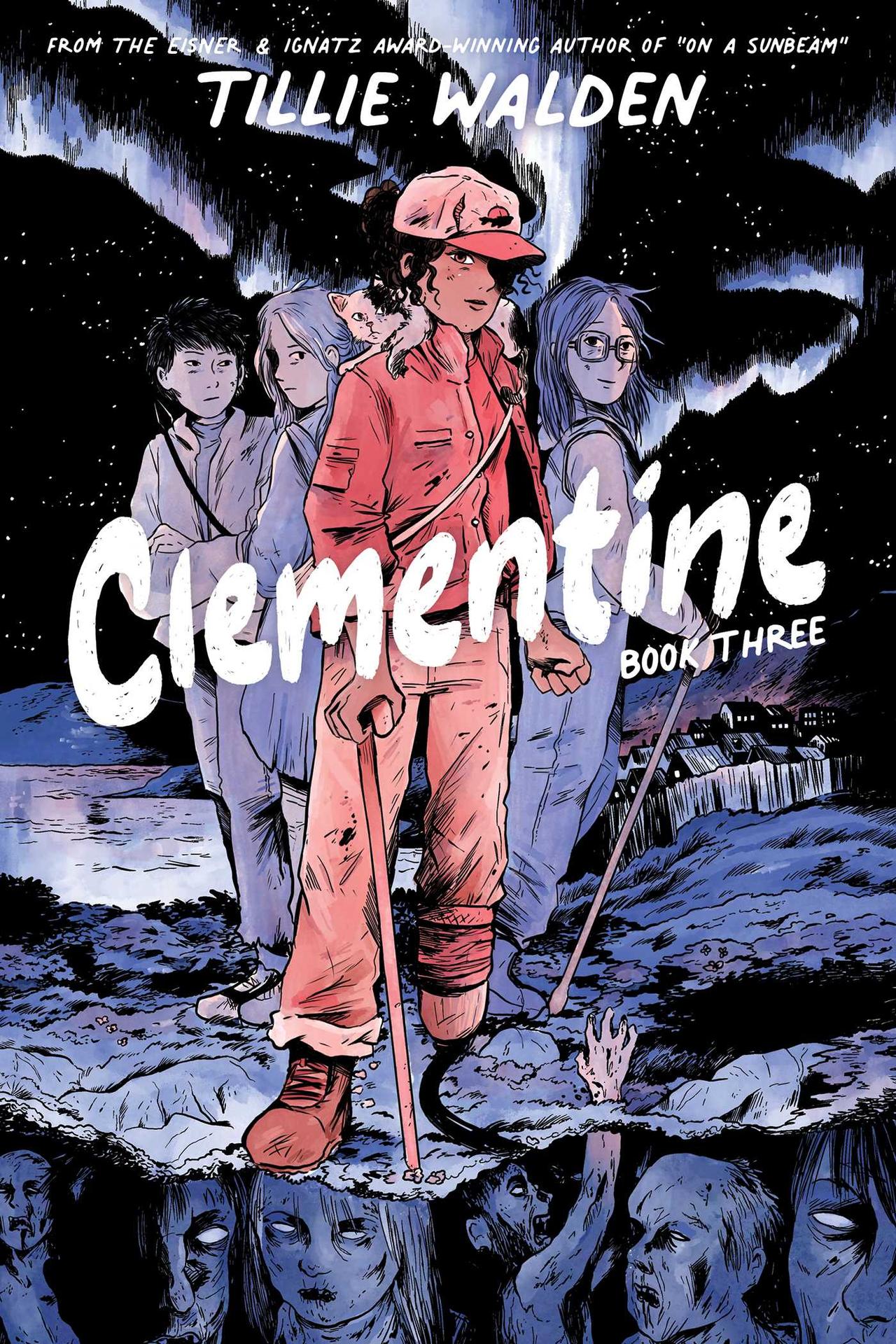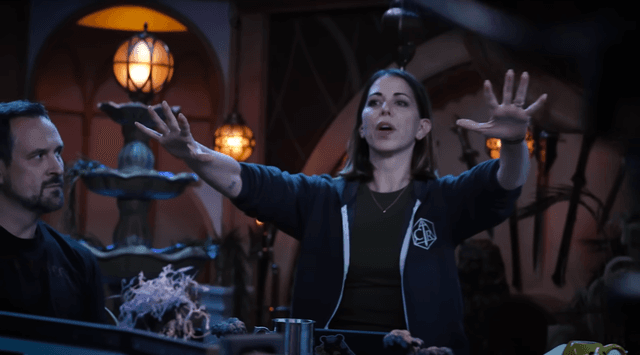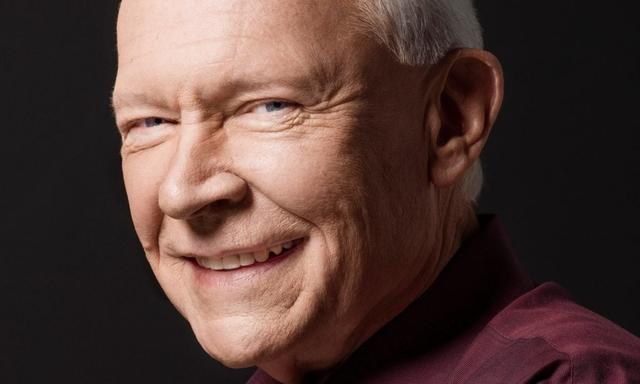If you click on a link and make a purchase we may receive a small commission. Read our editorial policy.
Inside the evolution of Tillie Walden from "sweet gay stories" to The Walking Dead: Clementine and beyond
Clementine Book 3, the final chapter in Tillie Walden's critically acclaimed trilogy of Walking Dead graphic novels, is finally here!

Tillie Walden's trilogy of Clementine graphic novels boldly reenvision the universe of The Walking Dead. Following Clementine, a teenage girl from Telltale's The Walking Dead video game, Walden's stories explore what it means to come of age after the world has ended. Like any great Walking Dead story, the Clementine books are as gutwrenching as they are cathartic, thanks to Walden's intimate storytelling voice.
With Clementine Book 3 out now wherever great comics are sold, we sat down with Tillie Walden to discuss how her experiences as a mother have impacted the direction of the Clementine books, the challenges of writing and lettering dialogue in Greenlandic and Danish, what makes a villain compelling to write, as well as her hopes to see stories in the Walking Dead universe that expand beyond the North American continent.

Popverse: So it's great to speak with you about Clementine today. I worked at a comic shop in a library for a few years, and so I remember having Clementine at our shop and at the library work done and it was just like cool to know that there was a book out there for YA readers and above to check out. And there were a lot of kids who didn't even know about The Walking Dead.
Tillie Walden: Yeah, yeah.
There were a lot of teenage girls who I saw were drawn to it. It was just interesting, because I was a teenager when The Walking Dead show came out. Although there were these great female characters on the show, I don’t think it was really marketed towards teen girls, like at all.
No! Not at all, not in the slightest.
So it was fun to see that discovery for them.
Totally. I mean it's also like not only was it not marketed, I think towards women, towards queer people, I think it was reflected in the people who were making it. Like a woman's never actually made The Walking Dead before, like drawn it, or written it. And obviously then neither has a lesbian. So it was fun to be like ‘Oh, this is like actually kind of a new era for this IP and I'm really happy to be doing it?

Yeah, 100%. And I guess you know like related to that, with Clementine, over the course of these three books, we've seen this theme of parenthood take place, and motherhood in particular. And so, from what I understand, you became a mom in the process of making these books. And so, also given the way that that book opens, did your own experiences with motherhood impact your characterization of Olivia?
Totally. Yeah. It's extremely 1:1. Olivia's birth scene is short, but it's my birth. It's the same birth. Luckily I was able to get an epidural and Olivia couldn't. But yeah, even like, way back when, when I was working on book 1, I agreed to do this trilogy for a number of reasons. It seemed like an interesting challenge. It seemed like a way to reach new fans, but it also felt like a way to give my wife and I some financial stability for a few years so we could have a baby. And as we were thinking about this and I was drawing book 1. I was struggling to get pregnant. I was like, ‘Maybe if I make Olivia pregnant and manifest it. If this character, if this poor teenage girl has to go through with it, it'll happen for me.’ And it was in book 2 that I managed to actually get pregnant. And I remember drawing the baby in book 2 when Clementine has a vision of Amos holding his child. And it was very emotional for me, because I was drawing this thing that I wanted so badly. And then it was so surreal to draw book three with, like, a sleeping baby beside me. So yeah, my own journey into motherhood is very much reflected in the series. It's like it's too all-encompassing of an experience to not put it in your book. I don't know how I would ignore it.
Right. And, you know, I think even like within like a zombie but also coming-of-age story like this, it's very emotional to introduce new life, in this sense of future within this baby.
Yes. Oh yeah and I think that a big theme in book 3 is about how with life comes death. And I think with birth, and at least in my own birth experience, it brought me closer, mentally and physically, to death than I had ever been, and these sort of boundaries around ourselves, around our own mortality, around the time we have - it was a pressing question on my mind while working on book 3, which led to some of the decisions that I made in the story. But I think it's all over the series. It's like everyone is struggling and trying to stay here to build a life that is worthy. But it's so hard to get all the time that you crave.

Absolutely. Yeah. So within that vein, it does seem like across these three books, you were really responding to and processing things as they were happening. And so, did you have like some ideas when you were building out book 1, perhaps of, like, ‘Oh this is where she might end up in book 3,’ or was it more immediate?
It was pretty immediate. Now looking back, I wish I had planned it a little bit more because I would have ended up not redrafting books 2 and 3 multiple times. Especially book 2, but book 3 also a lot. I wish I had planned it a little more, but I think that I didn't really feel like I had a lot of time because I had to do these books pretty quick. And it also felt like it wouldn't actually be too bad of a thing if the books ended up being somewhat responsive to where I was at in that moment, so that immediacy I think, brought something to it. There's only one plot point that I came up with way back in book 1 that I wasn't able to do all the way until book 3, which was that I really wanted Clementine to go back to school. At some point I wanted her to sit at a desk with a teacher at the front of the room and learn something. And I knew that this being a Walking Dead series, it wouldn't be okay for me to just have a whole book about, like, [singsongy] ‘My Day at School.’ I would have loved to do that, I love a low-key slice of life book. But I was hell bent on getting it in there. I was like, I don't know where she's going to go. Every location, for each book, was planned spur of the moment. After Vermont, I was just like, ‘How about Canada?’ And then after Canada, I was like, ‘How about Greenland?’ It was like, ‘Why not? Let's just keep going north.’ And the more I looked into it, the more I learned about Greenland, the more I was like, ‘Oh, I actually think that Greenland would do very well in a zombie apocalypse.’ It's a place that has been inhabited by people who are survivors for a very long time. But yeah, a longwinded answer to say that, no, it unfortunately was not very planned, and a lot of making it up as I go.
Well and that’s a nice contrast to perhaps how video games happen, you know. Like they're very, very planned.
And you can feel it. Almost.
I think there’s something to be said about, perhaps mirroring what the characters are going through when making a piece of art, I suppose.
A little more like jazz than it is classical. It can sometimes, I think be messier. It can sometimes be a little more dissonant, but it has a life to it, you know.

To go back to Greenland, I was so fascinated by the amount of Greenlandic language that's used in this book. So could you talk a little bit about how you went about that, and also all the Danish dialogue as well.
There's a lot. There's a lot. Yeah, I was thinking about it as I was working on it. And I grew up reading manga, and there's sort of a tradition in manga of when a character is hearing text in another language, they put it in brackets. And you move along with your day and you understand it. But I was really impacted. I spent many years while working on my books traveling, and I lived in a lot of places where I had no idea what was going on and it is an overwhelming experience to be around people and to hear conversations and dramas that you can’t figure out. And I really wanted to give Clementine a more authentic travel experience. I was like, ‘Yeah, I could translate this text, but this girl has no idea what they are saying. She doesn't even come close to having any way to begin to understand Greenlandic or Danish.’ And I also felt like, that if I was going to set this book in a place that I've never been to, a place that I don't know a lot about, the least basic thing I can do to show respect for this place is to honor the language that is actually spoken there.
And it turns out it's actually really easy to find translators. I mean, this is like a little more niche. I needed someone who could translate Danish and Greenlandic. And it took a little hunting. But, I found a translator, multiple translators to work with. I wrote all the dialogue in English. I showed them the book to be like, ‘This is the person saying it. This is the speech bubble.’ They translated everything. I lettered it all out by hand. I have yet to actually talk to someone besides the translators and a few people that I worked with on this book. I haven't talked to a lot of people who speak Danish or Greenlandic to get their take on how it comes across. But it’s certainly an attempt. It was certainly my best effort to try to give some authenticity to what life is like in Nuuk. And yeah, it was a lot of fun. It was wild. I've never hand lettered in another language before because my books have been translated, but they often have someone else letter it, you know, in German, in Spanish, and in anything. So yeah, kudos to the translators.
Through not translating the speech in other languages, we really get Clementine's perspective. And this subconscious festering that sort of happens within our minds as well as her mind. I think there's a sense of frustration.
Yeah! Like, ‘what are you saying?’

And this sense of female rage that I think is at the core of this story especially, once she gets close to the Gardener and that whole mystery. So I guess to go back to Greenland, one thing that I was thinking about was with Robert Kirkman's original vision for The Walking Dead, I think he takes a lot of elements of wholesome American culture and makes it violent or disturbing in some way and really, like, Negan's bat, being like the ultimate symbol of that. But I think taking a Walking Dead character out of like an American context and not even North American context anymore, pushes things just into completely new territory. And so I think, like you were saying before, like, ‘Oh, let's keep going north.’ Were you also thinking about the broader world of The Walking Dead and and wanting to explore that?
Oh yeah. Totally, I think that. It's a hard choice as a writer because you always have the choice of staying in your comfort zone where you understand things to a degree that you can write about it eloquently. Like I can write eloquently about the American public school experience because I lived it, but you always lose something too by staying in your lane. And I had exactly the same thought you did where I was just like, ‘What is going on with survival? And other groups of people and other places that have other histories,’ like America has such a specific and short history. And the rest of the world is ancient. I mean, America is actually technically ancient. But I was so curious about how it would feel to tell one of these stories in a place that wasn't predominantly American. And it brought about a lot of challenges because there was such a learning curve. But I think it's so cool. And it's also like if The Walking Dead is to continue, like in my mind, this is the future of it. It's looking outward and it's looking beyond because we've sort of done a lot of what we can in this American, especially southern, especially male, especially white, especially able bodied context. It all adds up. But when you enter these new spaces and you bring about new voices and new perspectives, I just think it's a little more interesting to read.
100% yeah, yeah. There's that line, like, ‘These people have been living here for 4000 years.’ I saw this documentary on NatGeo about how the Vikings briefly went to Greenland. And there are already people there. And [the Vikings] were like, ‘Oh, okay.’ Those people have encountered so many different waves of other people showing up or people who are perhaps undead.
Totally, totally. And I think that there's just such a vein in the American sensibility of individualism and of like, ‘This is all happening to ME.’ And I liked the idea of being like, well, what if it's not happening to me? What if this is like, ‘Let's go to a place where they think about things a little bit differently. And my hope is that, I'm not in charge of any of this, I don't know what the future of The Walking Dead is, but my hope is that you could find artists from these places to continue these stories and to expand. I think that would be a fabulous future. But I'm sitting over here on the sidelines I did my books, and who knows what's to come later?

Yeah, fingers crossed. So going back to what we talked earlier about female rage. I think it made me think back to characters like Miss Morro in book 2 and, of course, the Gardener in this one. And so to me they're interesting because they subvert our expectations for what we expect from a villain and The Walking Dead. Because they're not dudes walking around beating someone's head in with like, a baseball bat. Was that a conscious choice you made to really center different varieties of women's experiences?
I think that my editor, was urging me early on to write a story, especially with book 2, with a villain. And my initial instinct was with book 2 was to not write a villain, but to make the villain cholera and bacteria, because I really wanted to write about sewage systems. That didn't fly. They did not want a book about cholera. It's okay. If I want to make a book about cholera, I can. But when I thought about villainy, when I thought about what drives people to do harmful things - I don't think my mom's gonna listen to this - I think about my mom. I think about, like, girls who bullied me. I think about all of these people where, I actually think the pain they've caused me is so much worse because they themselves are suffering so deeply and it's so understandable, and it makes so much sense. It makes so much sense. And so I don't know how to write just like an evil guy beating people up, it really doesn't make sense for me. And it's also like, creatively, a dead end. It's like a dead end street. So I think, when it came to writing characters like Miss Morro, characters like The Gardener, it felt really natural to center the female experience and also to center female experiences as we age. The way we torment ourselves, the way we torment others, really changes as we get older. And I think that as I get older, I become much more interested in it. How we get stuck in our ways, how we don't set out to be bad, like did The Gardener set out to be bad? I don't think she did.
It became that and it was hard because I am almost extremely resistant to ever writing queer characters who do a lot of bad things. I almost always try to keep my queer characters focused on the good because this world is extremely harmful to queer people, and I feel like that's the least we could do is have some good characters out there. But book 3 was the first time I ever sort of waded into the idea of a queer woman who is not a good person and who is doing harmful things. It was really fascinating to work on and it suits where I'm at right now with queerness and queer stories, which is that, at this juncture, I'm craving complexity. Like when I wrote a book like On A Sunbeam, I just wanted gay people to be happy and safe and people like that book because that's what it is but now, I want to explore the dark side because I feel like as I get older I see that dark within me more frequently, especially as you get further and further away from having come out and dealt with that initial blow of accepting who you are. All of your understanding of your identity really changes and really morphs and really does not fit the molds that I think people want it to. And so yeah, that was all on my mind while working on book 3.

100%. There's almost this, like intergenerational aspect. Like we saw that with Illuna and her friction with Fen and Clementine, and so that all makes sense. The kind of tiered, I don’t want to say bullying, but the ways that people can aggress each other, perhaps.
I know, I think about it a lot because I went to an all girls middle school and I faced some of the most unique torture I've ever experienced in my life there, as well as some of the best moments of my life. And I think about how even with the lack of sort of structure in society when we form groups and when we form power dynamics, it is so difficult to not fall into the bad habits. It's so hard not to crave power, not to use it. Yeah. I was thinking a lot about like these group dynamics, especially amongst girls and a lot of that was drawn on my own experience of being around a lot of girls and seeing how we sort of create a kingdom for ourselves with a lot of fairness, but a lot of a lot of violence too.
To wrap things up here, do you have anything else that you'd like to share about the book or just any final thoughts?
It's always interesting, right before a book comes out. I have no idea what people are going to think about it. I don't keep very close tabs, usually, on how a book is received. I usually rely on what people just tell me when I'm on a book tour like, ‘What do you think? Do you like it?’ I'm curious too because as I evolve, I wonder how the people who read my books are evolving because I have a lot of young people who loved On A Sunbeam, who need sweet gay stories. And I'm curious how this book will feel for my audience. But I also have a lot of trust because I think that my guiding light as an artist has been, ‘If all the male authors out there believe in their voice, why shouldn't I believe in mine?’ Like I think that that's a way to create some equality is if I treat my books the way they treat their books, which is like, this is good shit right here. So I'm proud of it. I hope people like it and I think that everything that I would want to say about it is sort of within the pages and can be experienced.
Get ready for what's next with our guide to upcoming comics, how to buy comics at a comic shop, and our guide to Free Comic Book Day 2025.
Follow Popverse for upcoming event coverage and news
Find out how we conduct our review by reading our review policy
Let Popverse be your tour guide through the wilderness of pop culture
Sign in and let us help you find your new favorite thing.
















Comments
Want to join the discussion? Please activate your account first.
Visit Reedpop ID if you need to resend the confirmation email.